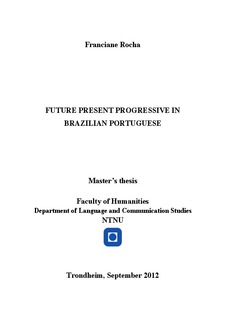Future Present Progressive in Brazilian Portuguese
Master thesis
Permanent lenke
http://hdl.handle.net/11250/244049Utgivelsesdato
2012Metadata
Vis full innførselSamlinger
Sammendrag
The use of the present progressive to express future is a grammatical construction imported into Portuguese from English. In this construction here called Future Present Progressive (FPP), the verbal predicate expresses the present tense, while a temporal adverb locates the event in the future. The assimilation of this construction to Brazilian Portuguese (BP) enriches the language’s inventory of periphrastic expressions of the future tense.
This work studied the internal structure of FPP constructions in BP and the relationship between its components. Lexical and grammatical aspects were considered to investigate why utterances such as: ‘Estamos nos mudando em duas semanas’ (We are moving in two years) are grammatical, while utterances as: ‘*Estou morando no Candá ano que vem’ (*I am living in Canada next year) are not, although both expressions are grammatical in the present progressive in BP. The research was conducting with naturally occurring language, collected from the Twitter microblogging service, using a methodology, which one might call digital linguistics. The data was treated using the resources of the multi-lingual database TypeCraft, and is freely available at: http://typecraft.org/TCEditor/1730/.
Our analysis of FPPs focuses on the relationship between lexical and grammatical aspect and suggests an extension of the semantic features that define different aspects. It furthermore highlights the role that the stage-level predicate ‘estar’ plays in deriving the semantics of this construction. Our research suggests that, besides the combination between lexical and grammatical aspect, different semantic mechanisms can also influence the compatibility pattern of verbs and syntactic constructions. Our research also shows that the FPP, although a borrowing from English, has morphosyntactic and semantic properties that makes it an integral part of the BP grammar.
